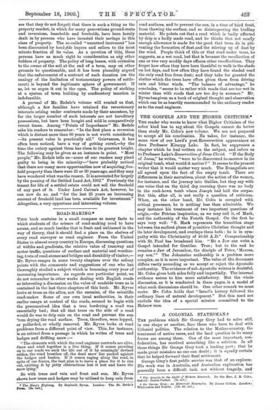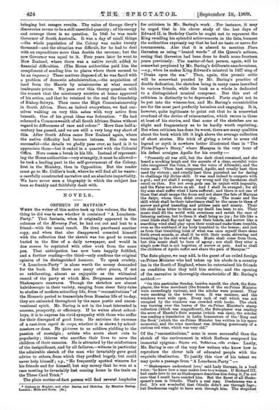A COLONIAL STATESMAN•t THE problems which Sir George Grey had
to solve still, in one shape or another, face' those who have to deal with Colonial politics. The relation to the Mother-country, the treatment of native races, and the land question in its many forms are among them. One of the most important, con- federation, has received something like a solution. In all these things Sir George Grey took a leading part; that he made great mistakes no one can doubt ; it is equally certain that he helped forward their final settlement. George Grey's first public service was that of an explorer. His work was in Australia, and Australian exploration has generally been a difficult task, not without tragedy, -and.
The Gospels in as light of Modern Research. By the -Rey. J. R. COI:. Oxford: James Parker. [es. net.] t Sir George Grey.: an Historical Biography. By James Collier. ,London: Whiteombe and Tombs. [12s. Q. net.] bringing but meagre results. The value of. George ,Grey's discoveries seems to be a still unsettled quantity ; of.his energy and courage there is no question. In 1841 he was made Governor of South Australia. It was 'a day of small things —the whole population of the Colony was under twenty thousand—and the situation was difficult, for he had to deal with an expenditure more than double the revenue; but the new Governor was equal to it. Four years later he went to New Zealand, where there was a native revolt added to financial difficulties. (The- Home authorities paid him the compliment of sending him to placee where there seemed to be an impasse.) These matters disposed of, he was faced with a problem of domestic administration,—the acquisition of land from the Maoris by missionaries at what seemed inadequate prices. We pass over this thorny question with the remark that the missionary societies at home approved of his action, and that he retained to the end the friendship of Bishop Selwyn. Then came the High Commissionership in South Africa. Here, as indeed everywhere, we find our- selves walking on very thin ashes with very active fires beneath. One of his great ideas was federation. " He had schemed a Commonwealth of all South African States without regard to differenoes of race and colour." More than half-a- century has passed, and we are still a very long way short of this. After South Africa came New Zealand again, where the native difficulty had become intense. His rule was successful—the details we gladly pass over, so hard is it to appreciate them—but it ended in a quarrel with the Colonial Office. Here comes a break in his life. Instead of represent- ing the Home authorities—very strangely, it must be allowed— he took a leading part in the self-government of the Colony, first in the Ministry, then in Opposition. But the reader must go to Mr. Collier's book, where he will find all he wants : a carefully constructed narrative and an absolute impartiality. We have never seen a biography in which the subject has boen so frankly and faithfully dealt with.











































 Previous page
Previous page